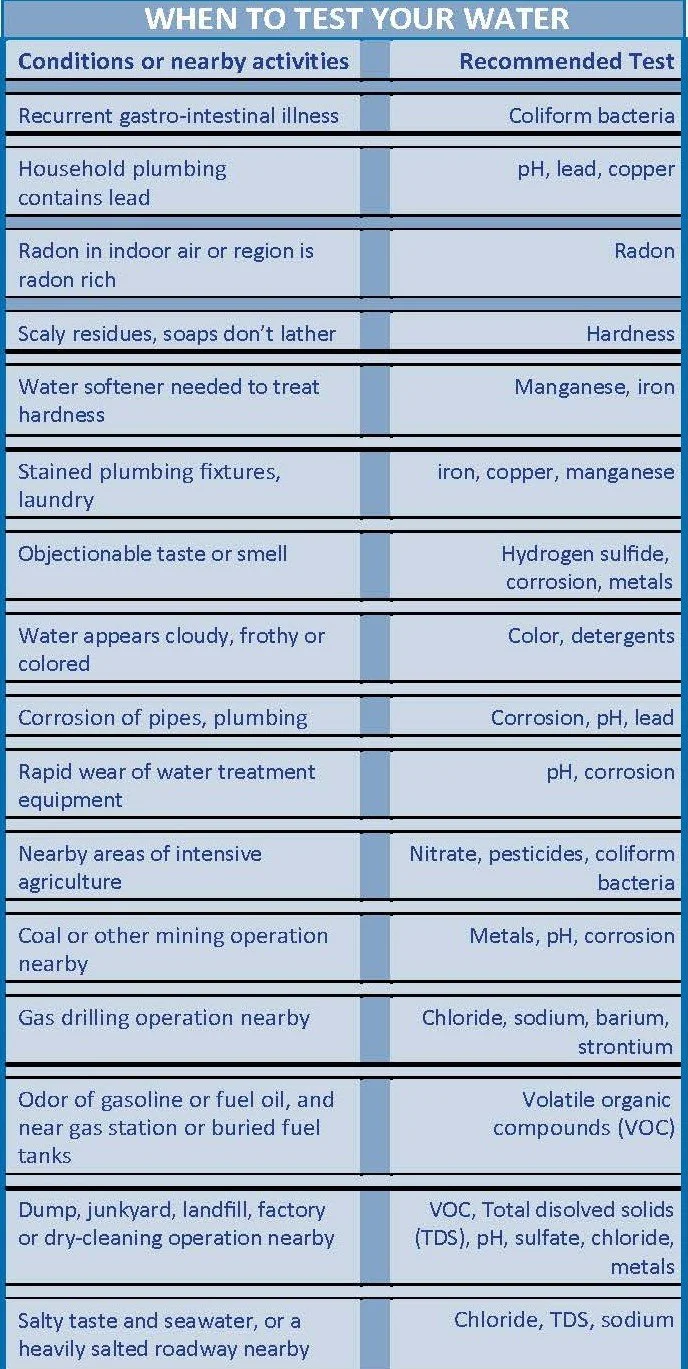What’s ON TAP?
What’s ON TAP in Public Water Systems?
When you turn on the faucet, where does the water come from? If you pay a water bill, you are purchasing water from a public water system, where your water is monitored, and tested, and the results reported to the federal, state or tribal drinking-water agencies responsible for making sure the National Primary Drinking Water Standards are met. Your water company must notify you when your water has contaminants that may cause illnesses or other problems. Most people in the United States receive water from a community water system that provides its customers with an annual water-quality report, also known as a Consumer Confidence Report. Normally, you will receive that with your water bill once a year, in July. The report contains information on contaminants found, possible health effects, and the water’s source. If you do not receive a report, contact your water company for this information.
What’s ON TAP in a Private Water Supply?
If your drinking water comes from a household well or a private water supply, not from a public water system, you alone are responsible for assuring that the water is safe. For this reason, routine testing for a few of the most common contaminants is highly recommended. Even if you currently have a safe, pure water supply, regular testing can be valuable because it establishes a historical record of water quality. This record is helpful in solving any future problems and in obtaining compensation if someone damages your water supply.
Do you have taste, odor and staining issues?
Test for sulfate, chloride, iron, manganese, hardness and corrosion - every three years. If you suspect other contaminants, test for these also.
Should I Have My Water Tested?
The answer to this question depends on several factors. It concerns your health and the health of your family, so you need to know some basic facts. In addition to illness, a variety of less serious problems such as taste, color, odor and staining of clothes or fixtures are signs of possible water-quality problems. Other things to think about include how close water well is to septic systems, and the composition of your home’s plumbing materials.
How Frequently Should I Test?
Test your water every year for total coliform bacteria, nitrates, total dissolved solids and for pH levels, especially if you have a new well, or have replaced or repaired pipes, pumps or the well casing.
Do I Need a Full Analysis of My Water?
Most likely, the answer is no - if you are on a public water supply system. Many small and large cities have regulations and procedures to ensure your water is safe. That said, the government supplier’s responsibility ends at your property. If you live in an old building or a new building that used poor materials for construction, it is advisable to test your water. In most cases, the more limited chemical analysis of trace metals and heavy metals would be enough. Regardless of your water source, here are two situations that may require testing. Do you suspect lead may be in some of your household plumbing materials and water service lines? Most water systems test for lead as a regular part of water monitoring. These tests give a system-wide picture, but do not reflect conditions at a specific household piping, spigot, or faucet. If you want to know if your home’s drinking water contains unsafe levels of lead, have your own water tested, and have water tested regularly at the post-treatment system to ensure there is no exposure. Testing is the only way to confirm if lead is present or absent. Some faucet and pitcher filters can remove lead from drinking water. If you intend to use a filter to remove lead, be sure to get one that is certified by NSF International to remove lead. For more information, visit www.epa.gov/safewater/lead.
Are you considering a home water-treatment unit?
It is complicated. Most public water supplies do not require a water filter prior to drinking water to meet federal, state or local regulations. However, some people may want to filter water for health reasons or personal preference. Find out what is in your water and what you might want to remove before contacting potential dealers. Be informed so you can make the right decisions. To help you, please visit: www.epa.gov/safewater/faq/faq.html#hwtu and www.epa.gov/safewater/wot. Routine testing for a few of the most common contaminants is highly recommended. Even if you currently have a safe, pure water supply, regular testing can be valuable because it establishes a record of water quality. This record is helpful in solving any future problems and in obtaining compensation if someone damages your water supply.
What Empire Water & Soil will do for YOU:
Empire Water & Soil will send experts to collect samples and/or analyze samples directly in your home. We can provide immediate field results for certain analyses and later the final quantitative analytical results for your specific parameters. Ask if this service is available, since you may obtain better samples and more reliable test results.
Empire Water & Soil will help you decide what specific type of filter may be needed in your home: however, for a best-informed decision, water testing would be required first, to determine the chemical profile of your water.
Empire Water & Soil are here to answer your questions! We are your personal scientists and engineers!
